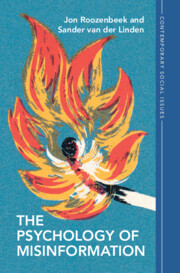
-
Select format
-
- Publisher:
- Cambridge University Press
- Publication date:
- March 2024
- April 2024
- ISBN:
- 9781009214414
- 9781009214407
- 9781009214360
- Dimensions:
- (229 x 152 mm)
- Weight & Pages:
- 0.432kg, 194 Pages
- Dimensions:
- (229 x 152 mm)
- Weight & Pages:
- 0.25kg, 194 Pages
You may already have access via personal or institutional login
Book description
King Charles III is Dracula's distant cousin. Governments are hiding information about UFOs. COVID-19 came from outer space. These sound like absurd statements, but some are true, and others are misinformation. But what exactly is misinformation? Who believes and spreads things that aren't true, and why? What solutions do we have available, and how well do they work? This book answers all these questions and more. Tackling the science of misinformation from its evolutionary origins to its role in the internet era, this book translates rigorous research on misleading information into a comprehensive and jargon-free explanation. Whether you are a student, researcher, policymaker, or changemaker, you will discover an easy-to-read analysis on human belief in today's world and expert advice on how to prevent deception.
Reviews
‘Beware! The Psychology of Misinformation is a truth-shattering expedition into the darkest corners of human fallibility. Brace yourself for mind-boggling insights, jaw-dropping experiments, and countless 'aha' moments. Once you see through the smoke and mirrors, you will never fall for a phony conspiracy theory again.’
Jay Van Bavel - New York University
‘One of the most important and comprehensive books on the complex topic of misinformation. The authors reach well beyond the psychology of misinformation, to exploring its history, the dynamics of spread, and strategies to counter it, in this beautifully written and engaging book.’
Heidi J. Larson - London School of Hygiene and Tropical Medicine
Contents
Metrics
Altmetric attention score
Full text views
Full text views help Loading metrics...
Loading metrics...
* Views captured on Cambridge Core between #date#. This data will be updated every 24 hours.
Usage data cannot currently be displayed.
Accessibility standard: Unknown
Why this information is here
This section outlines the accessibility features of this content - including support for screen readers, full keyboard navigation and high-contrast display options. This may not be relevant for you.
Accessibility Information
Accessibility compliance for the PDF of this book is currently unknown and may be updated in the future.


